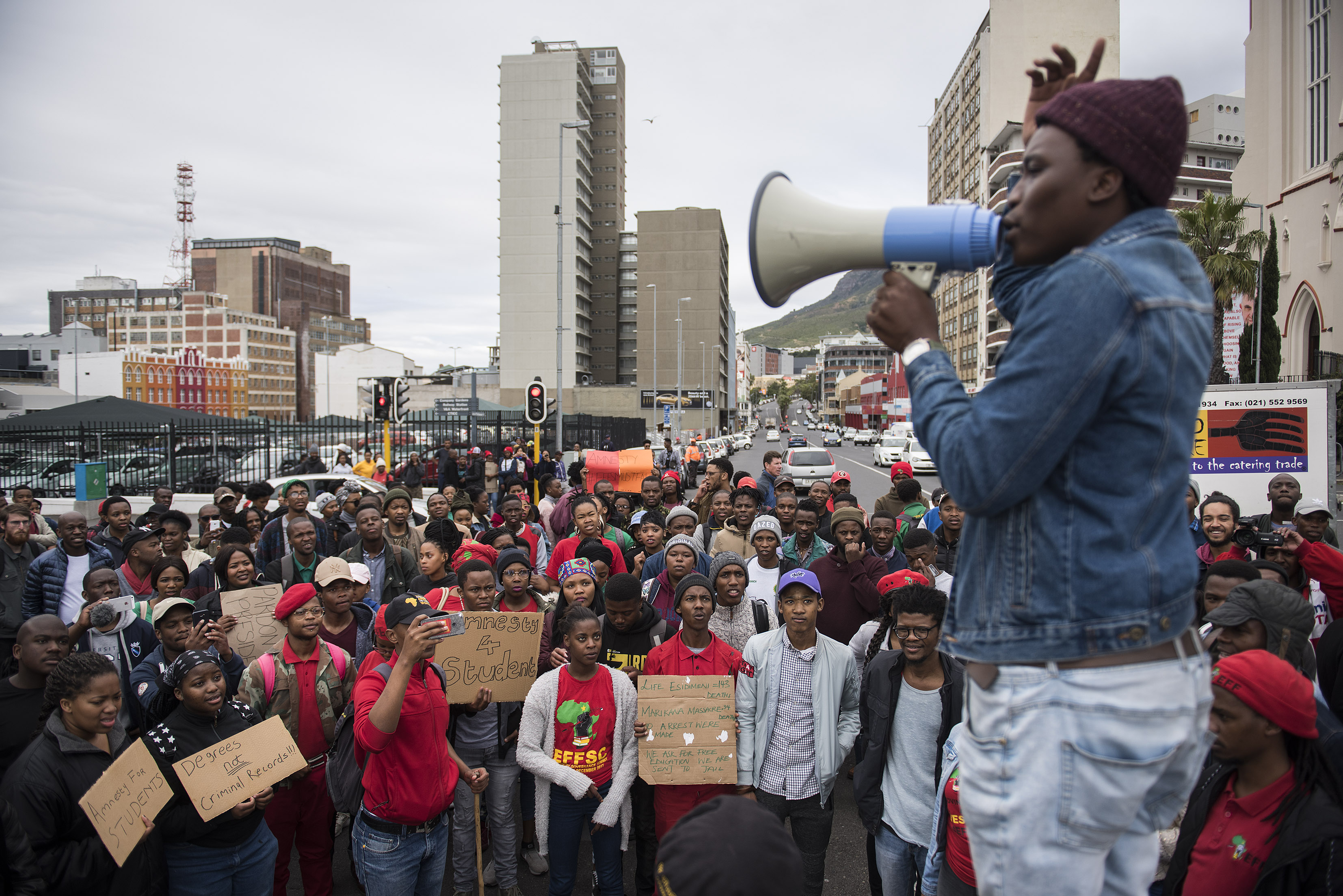Convicted #FeesMustFall protester Bonginkosi Khanyile is camping out at the Union Buildings. (Oupa Nkosi/M&G and David Harrison/M&G)
Huddled under a tree on the lawns of the Union Buildings in Pretoria — the site of the 2015 #FeesMustFall march that ended in violent clashes with the police — a few students sway to the refrain of what has become known as the decolonised national anthem.
This is where Bonginkosi Khanyile has chosen to camp out in a bid to secure a presidential pardon from President Cyril Ramaphosa after being convicted for public violence after participating in a #FeesMustFall protest.
Khanyile’s call for amnesty has this week been echoed by other student activists demanding a process akin to the Truth and Reconciliation Commission (TRC). Students are threatening another nationwide university shutdown if the presidency does not yield to their demand.
Khanyile is due to be sentenced in October. He aimed a slingshot at police during the 2016 protests over fees at the Durban University of Technology (DUT), where he was studying. He was granted bail in March last year after spending six months in Westville prison.
It was not the first time he had been arrested for participating in the protests and he and his comrades expected that, like the previous occasion, he would only spend two or three days behind bars, he says.
Khanyile travelled by bus from Durban to Pretoria on Tuesday with a thin mattress to stage the sleep-out on the Union Building’s lawns. He paraphrases revolutionary Thomas Sankara as he explains his plot to gain amnesty: “It takes a certain amount of madness to make a change.” He believes all students deserve amnesty because the violence of the protests occurred under political conditions.
Philani Gazuzu Nduli, also a DUT student, who calls himself Khanyile’s “confidant”, says students will intensify protest action until the president meets their demands. He acts as a sort of spokesperson for his friend, interrupting Khanyile every now and then to hand him a phone with someone wanting to interview him on the other end.
Khanyile may be a prominent face among the hundreds of students who face criminal charges but he is not the only one.
When Siyasango Ndwayi arrived in Delft, Cape Town, from the Eastern Cape in 2002, he did not know that his life would be thrown into chaos during a free education protest.
The student activist, who is doing an honours degree at the University of the Western Cape, has faced charges of attempted murder, malicious damage to property and public violence for his involvement in the protests in October 2016.
Ndwayi says he still does not know why he was charged with attempted murder and is afraid each time he appears in court.
“That feeling of standing in the dock each and every time in court, I’m dealing with the possibility that I may never go home again,” he says.
On Wednesday, Ndwayi was joined by a small group of protesters outside the gates of Parliament. The picket was organised to demand that students who face criminal convictions and jail time be granted amnesty.

[Students picketed Parliament this week. (David Harrison/M&G)]
“We categorically believe that when we decided to protest it was for a just cause and the violence that ensued as a result was because of the provocation of the police,” said Khululwa Mthi, an activist from the University of Cape Town.
The president dispatched Justice Minister Michael Masutha to collect the students’ memorandum of demands and discuss the matter of amnesty with the protesters.
Although it is within Ramaphosa’s powers to grant presidential pardons, his spokesperson, Khusela Diko, told News24 that the president does not want to interfere in the work of the National Prosecuting Authority and due process must be followed for presidential pardons.
Ndwayi is still on trial. When he was arrested in 2016, he was beaten until he passed out by the private security guards who detained him. A video of his battered body, captured by another student, was shared among fellow protesters. While the students mobilised for his release, Ndwayi was taken to Goodwood prison where he spent seven days.
He does not know how long his jail term could be if he is convicted, but for 24-year-old Khaya Cekeshe, the reality has already set in. Cekeshe was sentenced to eight years in prison after lighting a match in an attempt to burn a police car.
Three years of his sentence have been suspended and he is serving a five-year term in Leeuwkop prison. Cekeshe was charged with public violence, arson and malicious damage to property. Yonela Ngaleka, a Wits student who was charged alongside Cekeshe, is still to hear her fate.
At the University of Cape Town, a different process is helping to restore calm on campus after two years of distrust and mayhem at the height of the student protests.
The university’s Institutional Reconciliation and Transformation Commission (IRTC) has already granted amnesty to at least 12 students who had been expelled for their involvement in the protests. The UCT student representative council (SRC) has now called on all universities to start similar processes of reconciliation that would allow students to return to their studies without facing punitive measures.
The commission is structured like the TRC, and students have shared their perspectives on what led to violence during the protest before a panel of commissioners. It took UCT two years to formulate the IRTC after workers and students demanded a TRC following the infamous #Shackville housing protest in 2016.
In February, when the commission was announced, UCT council chair Sipho Pityana said trust was at an “all-time low” on campus between students, staff and management. But this Wednesday UCT students spoke of how calm had been “restored” to campus during the commission.
In his address to students outside Parliament, SRC deputy president Masixole Mlandu, who has also faced criminal charges, said:“This country has a history of forgiving people who have never asked for forgiveness … at least we are asking for forgiveness.”